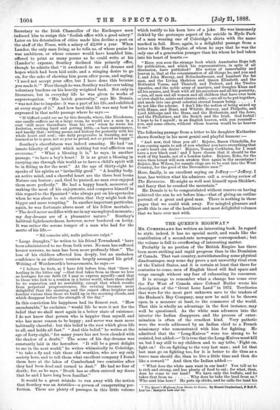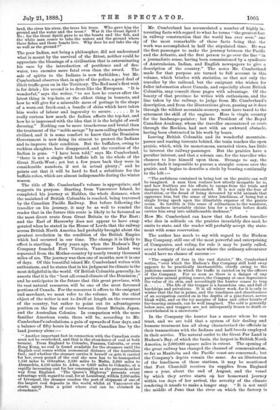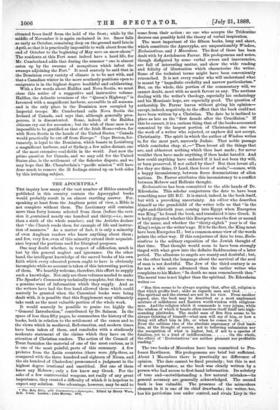THE QUEEN'S HIGHWAY.* Mn. CUMBERLAND has written an interesting book.
In regard to style, indeed, it has no special merit, and reads like the contribution of a second-rate newspaper correspondent; but the volume is full to overflowing of interesting matter.
Probably in no portion of the British Empire has there been more striking and rapid progress than in the Dominion of Canada. That vast country, notwithstanding some physical disadvantages, may some day prove a not unworthy rival even of the United States, and it is certain at least that there for centuries to come, men of English blood will find space and verge enough without any fear of exhausting its resources.
It is strange to remember what a change has come over the Far West of Canada since Colonel Butler wrote his - description of the " Great Lone Land " in 1872. Territories that were for the most part unknown save to the traders of the Hudson's Bay Company, may now be said to be thrown open, in a measure at least, to the commerce of the world. That this is wholly an advantage in the first instance, may well be questioned. As the white man advances into the interior the Indian disappears, and the process of exter- mination is often of the cruellest kind. Very pathetic were the words addressed by an Indian chief to a French missionary who remonstrated with him for fighting. He admitted that the " Long-Knives " were too strong to be resisted, but added:—" It is true that the Long-Knives must kill us, but I say still to my children and to my tribe, Fight on, fight on ! Go on fighting to the very last man ; and let that last man go on fighting too, for it is better to die thus as a brave man should die, than to live a little time and then die like a coward." And then the Indian added :-
" What does the white man want in our land ? You tell us he is rich and strong, and has plenty of food to eat; for what, then, does he come to our land? We have only the buffalo, and he
takes that from us Why does he take the land from us ? Who sent him here ? He puts up sticks, and he calls the land his
• The Queen's Highway from Ocean to Ocean. By Stuart Cumberland, F.B.G.S. Low'on : Sampson Low and Co. land, the river his river, the trees his trees. Who gave him the ground and the water and the trees ? Was it the Great Spirit ? No ; for the Great Spirit gave to us the beasts and the fish, and the white man comes to take the waters and the ground where these fishes and these beasts live.. Why does he not take the sky as well as the ground ?"
The poor Indian, not being a philosopher, did not understand what is meant by the survival of the fittest, neither could he appreciate the blessings of a civilisation that is exterminating his race by the introduction of pestilence and of fire- water, two enemies more fatal even than the sword. The sale of spirits to the Indians is now forbidden; but Mr. Cumberland observes that, in spite of the police, a good deal of illicit traffic goes on in the Territory. The Red man's first wish is for drink ; his second is to dress like the European. "It is wonderful," says the writer, " to see how he craves after the latest thing in top-hats, or the oldest thing in bonnets, and how he will give for a miserable mess of pottage in the shape of a worn-out frock-coat, a. bundle of skins which have taken
him weeks of labour and ingenuity to secure It is really curious how much the Indian affects the top-hat, and how he is impressed with the idea that it is the height of swell dressing." Nothi g can be more treacherous and brutal than the treatment of the " noble savage" by men.calling themselves civilised, and it is some comfort to know that the Dominion Government is now doing its utmost to protect the Indians and to improve their condition. But the buffaloes, owing to reckless slaughter, have disappeared, and the vocation of the Indian is gone. " I have been told," says Mr. Cumberland, "there is not a single wild buffalo left in the whole of the Great North-West ; yet but a few years back they were in considerable numbers, if not in actual plenty ;" and he points out that it will be hard to find a substitute for the buffalo robes, which are almost indispensable during the winter
season.
The title of Mr. Cumberland's volume is appropriate, and
suggests its purpose. Starting from Vancouver Island, he completed his journey at Halifax, the whole distance, when the mainland of British Columbia is reached, being traversed by the Canadian Pacific Railway. But before following the traveller on bis journey, it may be as well to remind the reader that in the future this route is likely to be favoured as the most direct route from Great Britain to the Far East; and the Earl of Harrowby does not appear to have exag- gerated when he stated in the House of Lords that the railway across British North America had probably brought about the greatest revolution in the condition of the British Empire which had occurred in our time. The change it is likely to effect is startling. Forty years ago, when the Hudson's Bay Company founded Fort Victoria, Vancouver Island was separated from the Mother-country by nearly twenty thousand miles of sea. The journey was then one of months, now it is one of days. Of this beautiful island Mr. Cumberland writes with enthusiasm, and he states that in his judgment its climate is the most delightful in the world. Of British Columbia generally, he asserts that it is the "best all-round climate of the Dominion ;" and he anticipates in the future that this great province, with Its vast natural resources, will be one of the most favoured portions of Canada. For the resources it offers to the emigrant and merchant, we must refer to the volume. But the chief object of the writer is not to dwell at length on the resources of the country, but rather to point out its advantageous position on the line of route between Great Britain, Japan, and the Australian Colonies. In comparison with the more familiar American route, there will be, according to Mr. Cumberland's calculations, a gain of upwards of four days, and a balance of fifty hours in favour of the Canadian line by the land journey alone :— " Another important fact in connection with the Canadian route must not be overlooked, and that is the abundance of coal at both -termini. From England to Colombo, Panama, Calcutta, or even Hong Kong, no coal is found available for the steamers until the English coal comes within economical distance of the Australian fuel ; and whether the steamer carries it herself or gets it carried for her, every pound of the coal she uses has to be transported 1,150 miles to Gibraltar, 2,130 miles to Malta, 2,950 miles to Alexandria, 4,150 miles to Aden, or 6,650 miles to Colombo, at a rapidly increasing cost for her consumption as she proceeds on her way from England. The Queen's Highway' presents every advantage with regard to coal, for at Louisburg, within 2,350 miles of Liverpool, the steamer reaches the port of shipment of one of the largest coal deposits ,in the world, whilst at Vancouver she .starts again from a point where coal can be obtained in abundance." Mr. Cumberland has accumulated a number of highly in- teresting facts with regard to what he terms " the greatest feat in railway construction that the world has ever seen," one of the most remarkable of these facts being that the work was accomplished in half the stipulated time. He was the first passenger to make the journey between the Pacific and the Atlantic, and the first person to go over the line " in a journalistic sense, having been commissioned by a syndicate
of Australasian, Indian, and English newspapers to • give a description of the country." The notes Mr. Cumberland made for that purpose are turned to full account in this volume, which bristles with statistics, so that not only the traveller by the railroad, but the emigrant who wishes for fuller information about Canada, and especially about British Columbia, may consult these pages with advantage. Of the beauty of that province he writes with enthusiasm, and the line taken by the railway, to judge from Mr. Cumberland's description, and from the, illustrations given, passing as it does through the wildest mountain-scenery, must have taxed to the uttermost the skill of the engineer. Here is virgin country for the landscape-painter; but the President of the Royal Canadian Academy, whom the traveller encountered en route through the Rockies, had met with an awkward obstacle, having been obstructed in his work by bears.
Leaving British Columbia and its wonderful mountain- passes and roaring torrents behind, the train reaches the open prairie, which, with its monotonous, unvaried views, has little to interest the railway-passenger. But the prairies have a peculiar interest, and that a solemn one, for the traveller who chances to lose himself upon them. Strange to say, the novice finds it impossible to pursue a straight course over the prairie, and begins to describe a circle by bearing continually to the left :—
" The awfulness contained in being lost on the prairie can well be imagined. A man then realises how utterly incapable he is, and how fruitless are his efforts to escape from the trials and dangers by which he is surrounded. ft is not only the fear of starvation, or the dread of being devoured by wild animals that oppresses him, but the sense of utter loneliness, of being but a single living speck upon the illimitable expanse of the prairie ocean. So terrible is this sense of solitariness to the wanderer, that madness invariably claims him for a victim before death
carries him away into unfathomable darkness." •
How Mr. Cumberland can know that the forlorn traveller who dies in solitude on the prairies invariably dies mad, he omits to state, and the reader will probably accept the state- ment with some reservation.
The author has much to say with regard to the Hudson Bay Company, still one of the most powerful and enterprising of Companies, and ruling, for rule it may be justly called, over a territory of ice and snow where the ordinary adventurer would have no chance of success :—
" The supply of furs in the vast district," Mr. Cumberland writes, "over which the Hudson's Bay Company still hold sway appears to be practically inexhaustible, chiefly owing to the judicious manner in which the traffic is carried on by the officers of the Company. For so soon as there is a danger of any particular animal getting scarce, the Company at once depreciates the value of its skin, and accordingly the hunter ceases to trap it. . . . . . The life of the trapper is a hazardous one, and full of hardships and privations. It is all winter work, for it is only in winter that the fur is prime, and the loneliness and cheerlessness of an occupation carried on in the depths of a pine-forest, across bleak wilds, and on the icy margins of lakes and other haunts of fur-bearing animals, can be well imagined. The cold is generally below zero, and trappers are not infrequently frozen to death or overwhelmed in a snowstorm."
In the Company the hunter has a master whom he can trust, and we are told that a system of fair dealing and humane treatment has all along characterised the officials in.'
their transactions with the Indians and half-breeds employed in their service. The natural outlet to the Great Fur Land is Hudson's Bay, of which the basin, the largest in British North America, is 2,000,000 square miles in extent. The opening of the great railway has changed the channel of communication, so far as Manitoba and the Pacific coast are concerned ; but the Company's depots remain the same. As an illustration of the loneliness of these stations, it may be mentioned that Fort Churchill receives its supplies from England
once a year, about the end of, August, and the vessel by which they arrive starts on her homeward journey
within ten days of her arrival, the severity of the climate rendering it unsafe to make a longer stay. " It is not until the middle of June that the river on which the factory is situated frees itself from the hold of the frost; while by the middle of November it is again enchained in ice. Snow falls as early as October, remaining deep on the ground until late in April, so that it is practically impossible to walk about from the end of October to the beginning of May save on snow-shoes." The residents at this Fort must indeed have a hard life, for Mr. Cumberland adds that during the summer " one is almost eaten up by the swarms of mosquitoes which infest the swamps adjoining the Fort." It need scarcely be said that in the Dominion every variety of climate is to be met with, and that a Canadian winter in the more southerly positions open to emigrants is in the highest degree healthful and exhilarating. With a few words about Thilifax and Nova Scotia, we must close this notice of a suggestive and instructive volume. Halifax, the Atlantic terminus of the " Queen's Highway," is favoured with a magnificent harbour, accessible in all seasons, and is the only place in the Dominion now occupied by Imperial troops. Mr. Cumberland calls Nova Scotia the Ireland of Canada, and says that, although generally pros- perous, it is discontented. Some, indeed, of the Halifax citizens cry out for secession ; but the wish of these men is as impossible to be gratified as that of the Irish Home-rulers, for with Nova Scotia in the hands of the United States, " Canada would practically be cut off from Europe." Cape Breton, for- tunately, is loyal to the Dominion, which boasts in Louisburg a magnificent harbour, and at Sydney, a few miles distant, one of the most extensive coal-fields in the world. Just now the prime question for Canada, and we may add for the United States also, is the settlement of the fisheries dispute, and we may hope that Mr Chamberlain's "pacific mission" will have done much to remove the ill feelings stirred up on both sides by this irritating subject.




































 Previous page
Previous page